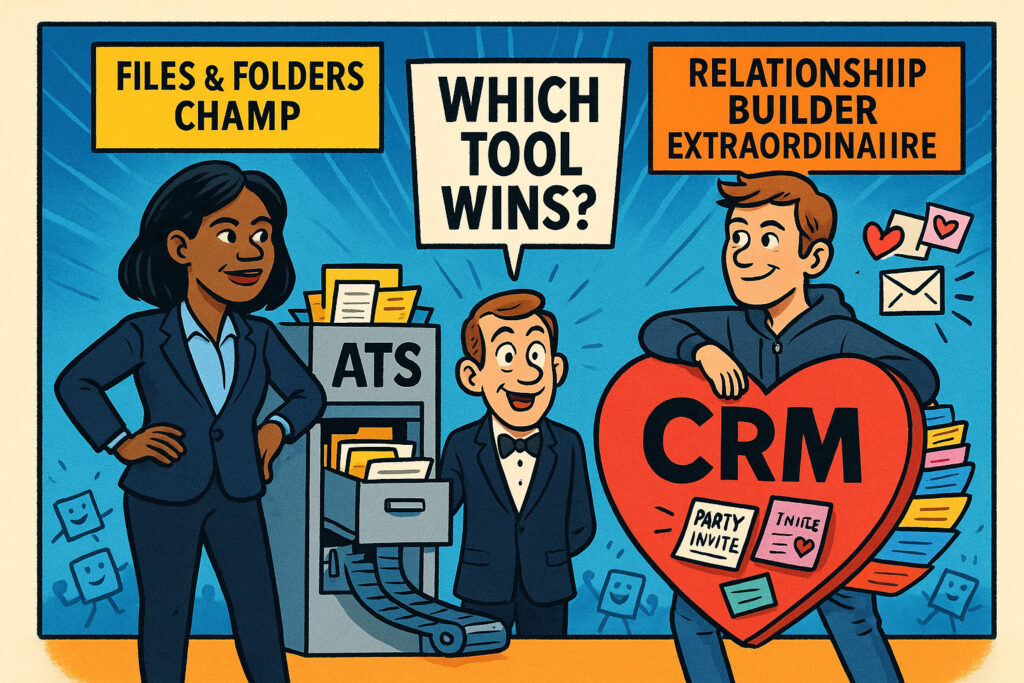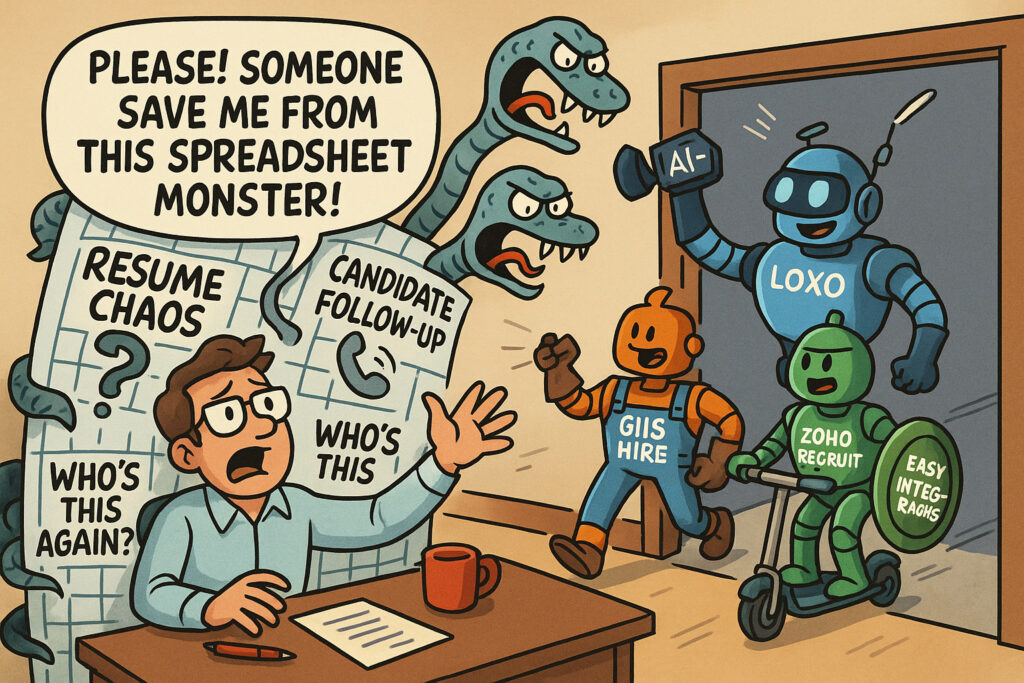Let’s be honest—hiring the right people when you’re running a small or medium business can feel a bit like running a marathon with a pebble in your shoe. Your time’s tight, the budget’s always just a smidge smaller than you’d like, and your HR “department” is, let’s face it, probably just one overworked human in a spare office or, sometimes, just you. I’ve seen this struggle up close from my time in IT support for recruiting firms. People get desperate. You want something that’ll actually help, not just another shiny new tool with a million features you’ll never use.
So, what’s the lifesaver here? The best Applicant Tracking Systems for small business—not the big corporate stuff. I’ve played tech support for a few of these systems, and I can tell you: picking the right one actually matters.

Why Bother With an ATS?
Listen, I hear you. “Isn’t an ATS just for big companies?” Not anymore. If you’re sick of juggling resumes in your inbox and wondering who on your team last emailed that promising candidate, trust me: an ATS is the way out of the chaos. The early versions of these tools were basically glorified spreadsheets. Now? They do a heck of a lot more—automating posts, sorting resumes, scheduling interviews, and even nudging your team to keep things moving.
If you’re wondering what’s the best Applicant Tracking System for small business, start with tools that save you time and hassle, not just add more to your plate.
What’s in it for you?
- Time you actually get back: No more copy-pasting job ads or digging through email threads.
- Save money (and headaches): Fewer hiring mistakes = less wasted payroll on the wrong person.
- Stay out of legal trouble: They help keep your process in line with things like GDPR.
- Keep everyone in the loop: No more “Wait, who talked to this person last?” confusion.
- Ready for growth: The best Applicant Tracking Systems for small business grow with you—no need to switch systems every year.
What Should You Look For in the Best Applicant Tracking System for Small Business?
Here’s what I’d put on my wish list if I were shopping for the best Applicant Tracking System for small business (and I’ve seen enough demos from the IT side to know what actually trips people up):
- Easy to use—really easy.
If you need a three-hour training video, forget it. You should be able to poke around and figure out the basics in twenty minutes, tops. Bonus points if it works well on your phone, because who’s not answering emails from the grocery store these days? - Transparent pricing.
Look, some of these companies bury extra charges deep in the fine print. Watch out for “Oh, that’s an extra $40 a month if you want email templates!” Always, always read the fine print. - Will it grow with you?
Maybe you’re just hiring one person now, but what about next year? Make sure the system can add more users, jobs, or even whole departments without giving you a headache.
Features you’ll actually use in an ATS:
- Pull resumes in automatically (called resume parsing)
- Post to job boards with one click
- Simple scheduling tools for interviews (because nobody likes endless email ping-pong)
- Templates for those emails you send over and over
- If you want to get fancy, look for talent pipelines or CRM features—but don’t pay for stuff you won’t touch.
Can it play nice with your other tools?
If you’re using BambooHR or Gusto for payroll, or living in Gmail and Google Calendar, make sure the ATS connects without you needing a PhD in IT.
Data security—because no one wants a headline about leaking candidate info.
Ask about data encryption and compliance. GDPR isn’t just for Europeans; it’ll catch you off guard if you’re not careful.
Good support and onboarding.
I’ve lost count of the times I had to call support for someone because their “easy” tool was anything but. Live chat and a decent help center can be a lifesaver, especially if your company doesn’t have its own IT folks.
A Quick Look at Some Top Applicant Tracking Systems for Small Business
I’ve seen these in action (and sometimes wrestled with them from behind the IT helpdesk), so here’s my no-nonsense take on contenders for the best Applicant Tracking System for small business:
Manatal:
This one leans into the whole AI thing—think smart candidate matching, tons of job board integrations, and a setup that won’t have you banging your head on your desk. It’s generally easy to use, but if you need advanced integrations, you might have to shell out for pricier plans or use something like Zapier. Also, the mobile app isn’t perfect (yet).
Greenhouse:
If you’re a fan of structure and want your hiring process to look like it was built by a NASA engineer, Greenhouse might be your thing. It’s loaded with analytics and interview scorecards, but it’s also expensive and takes a while to get the hang of. Oh, and you’ll need to get a quote—there’s no public pricing.
BambooHR (with ATS):
I’ve seen BambooHR win over many a frazzled HR team. It does everything—payroll, time tracking, benefits, performance reviews, and, yes, recruiting. The interface is clean, support is great, but its ATS is more “good enough” than “wow” if you’re hiring at high volume.
Lever:
Picture a tool that helps you keep tabs on not just current applicants, but everyone you might want to hire in the future. That’s Lever. It’s heavy on relationship-building features and analytics. It’s not cheap, though, and it can take a while to master.
Zoho Recruit:
Great for penny-pinchers or startups—there’s a genuinely free plan! Tons of customization, good resume sorting, and if you already use other Zoho apps, it’ll fit right in. That said, it can be overwhelming at first, with a lot of options and a bit of a learning curve.
Workable:
A solid, all-in-one recruiting platform. It’s user-friendly, has AI tools to help you sift through candidates, and plays double duty as a light HR system. But, beware—pricing goes up as your team grows, and many handy features are locked behind extra fees.
AshbyHQ:
Best for fast-growing teams who want everything in one place—ATS, scheduling, analytics, CRM. Real-time data dashboards are great, but it’s more expensive and probably overkill for a five-person team.
Eightfold.ai:
Honestly, this one’s geared toward big fish—huge companies with a focus on AI and workforce planning. The features are impressive (think: skills insights, internal mobility, etc.), but for most small businesses, it’s probably way too much. And the price tag matches.
Recruitee:
If you want everyone on your team involved in hiring (and not fighting over logins), Recruitee’s collaborative features are solid. Posting jobs everywhere is easy, and workflows are customizable. Some features—like analytics—require you to upgrade, and the mobile app isn’t as strong.
JazzHR:
Affordable, simple, and lets you post as many jobs as you want. It won’t wow you with advanced analytics, but for small teams who want to keep things straightforward, it’s a winner. Just be aware: certain “nice to have” extras, like visual reports or e-signatures, are paid add-ons.
What’s Best for Your Situation?
- Tiny budget? Zoho Recruit, Manatal, JazzHR—these might be the best Applicant Tracking System for small business on a shoestring.
- Want everything in one app? BambooHR
- Serious about structured hiring? Greenhouse, Recruitee
- Need to build a pipeline? Lever, AshbyHQ
- Scaling up fast? Workable, AshbyHQ
- Hiring hundreds? Eightfold.ai
My Parting Advice
Don’t get distracted by a list of features that would make your head spin. Start with your hiring workflow and what actually annoys you about it. Make a list of must-haves (and nice-to-haves). Try a few out—most have demos or free trials. And ask other SMB folks what worked or flopped for them. Sometimes the best insight comes from a quick coffee chat, not a product brochure.
FAQ: Picking the Right Applicant Tracking System for Small Business
Do I really need an Applicant Tracking System if I only hire a few people a year?
Short answer: Yes, you probably do. Even if you’re not hiring in droves, an ATS will save you a ton of time and headaches. No more digging through your inbox for resumes or playing detective to figure out who emailed a candidate last. Plus, most systems now are super easy to use and don’t require an IT degree—or even a big budget—to get started. You have free ATS
What’s the most important thing to look for when choosing an ATS for a small business?
Look for simplicity and flexibility. You want something you can figure out in under half an hour, not something that needs hours of training. Check if it plays nice with the tools you already use (like Gmail or payroll software). And don’t get sucked in by fancy features you’ll never touch. Focus on what makes your life easier today and won’t make you want to tear your hair out as your business grows.
Are there any hidden costs or gotchas I should watch out for?
Oh, absolutely—this is a big one. Lots of ATS providers advertise a low price, but then charge extra for stuff like email templates, integrations, or even just adding more users. Always read the fine print. If a feature is a must-have for you, double-check that it’s included in the plan you’re eyeing before you commit.
Bottom line: The best Applicant Tracking System for small business won’t make hiring easy, but it’ll sure make it easier. And in the SMB world, that’s good enough to get you back to the stuff you actually care about.


